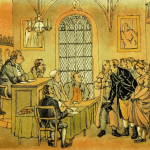From Conflict to Communion, the Lutheran-Catholic commemoration of the 500th anniversary of the Reformation, offers a summary of Luther’s theology, particularly on the points of dispute between Catholics and Lutherans. They offer the following summary of Luther’s claim that believers remain simul iustus et peccator, simultaneously just and sinners.
Though justified by God, “As believers who are in the process of being renewed by the Holy Spirit, we still do not completely fulfill the divine commandment to love God wholeheartedly and do not meet God’s demand. Thus the law will accuse us and identify us as sinners. With respect to the law, theologically understood, we believe that we are still sinners. But, with respect to the gospel that promises us ‘Here is Christ’s righteousness,’ we are righteous and justified since we believe in the gospel’s promise.”
They claim that this is not a contradiction, since “we must distinguish two relations of the believer to the Word of God: the relation to the Word of God as the law of God insofar as it judges the sinner, and the relation to the Word of God as the gospel of God insofar as Christ redeems. With respect to the first relation we are sinners; with respect to the second relation we are righteous and justified. This latter is the predominant relationship.”
But precisely here the claim runs counter to Paul. Paul does not say: You are under law and grace. He does not say: You are under law and grace, though the latter is predominant. He says, You are not under law but under grace (Romans 6:14-15). Luther is right, of course, that Christians still commit peccata. That is wholly different from being classified as a peccator. And Paul’s “not . . . but” indicates that we are not to see ourselves as subjects of law (in any sense of that word) but as under the dominion of grace; not as justified people still enslaved to sin, but as people freed from sin’s guilt and power by the Lord Jesus.













